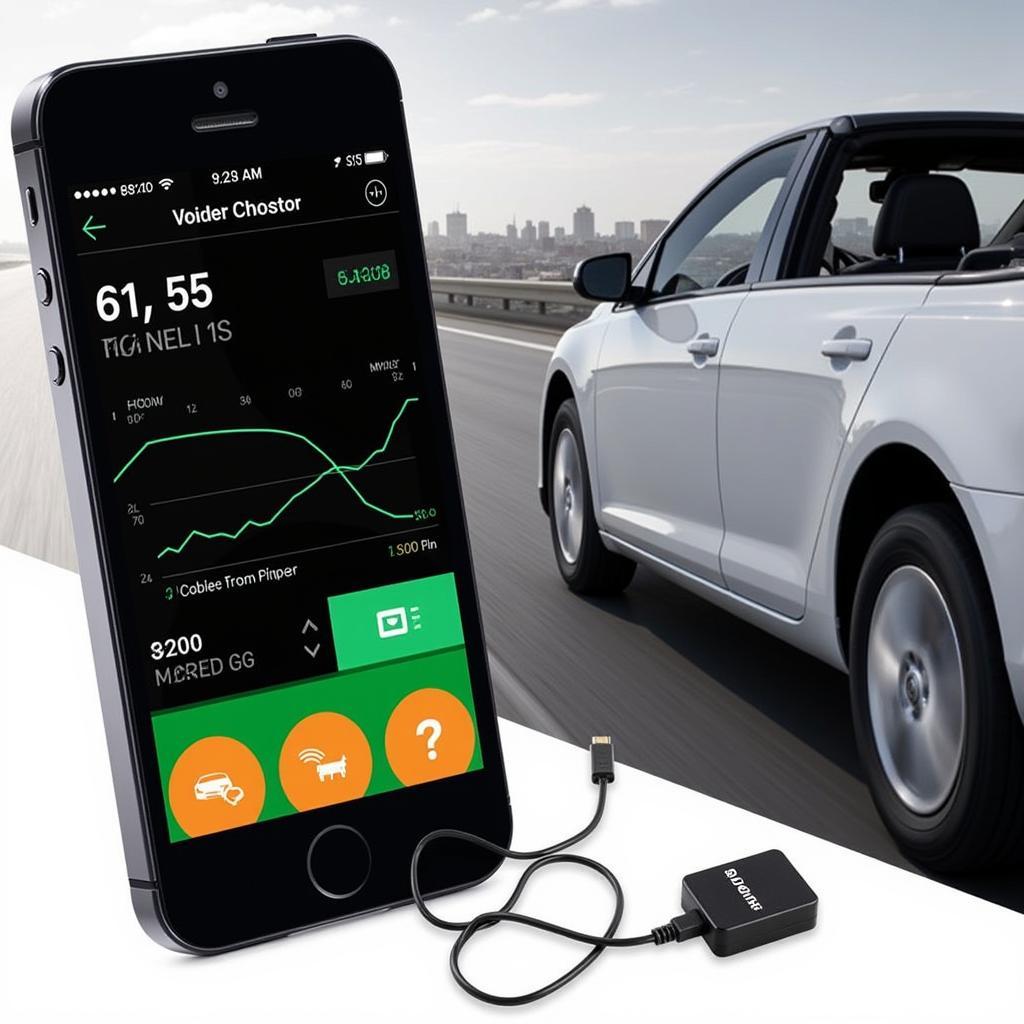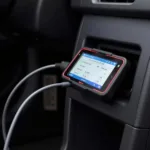The increasing use of mobile devices for vehicle diagnostics, particularly with OBD2 scanners and C4 connections, has raised concerns about potential security vulnerabilities. While these tools offer convenience and accessibility, it’s crucial to understand the risks involved and how to mitigate them.
Connecting your vehicle’s OBD2 port, especially through a C4 connection, to a mobile device essentially creates a gateway into its electronic control unit (ECU). This access, while valuable for diagnostics and modifications, can be exploited if proper security measures aren’t in place.
Understanding the Vulnerabilities of OBD2 and C4 Connections
Both OBD2 and C4 connections can be vulnerable if security is overlooked. Here’s why:
- Data Transmission: OBD2 scanners, particularly those using Bluetooth or WiFi, transmit data wirelessly. Without proper encryption, this data can be intercepted by malicious actors.
- Software Security: Mobile apps used for OBD2 diagnostics can vary in their security protocols. Poorly designed apps might have vulnerabilities that hackers can exploit.
- Device Security: Your mobile device itself needs to be secure. If your phone or tablet is already compromised by malware, connecting it to your vehicle’s system could worsen the situation.
Are Mobile Devices More Vulnerable Than Dedicated Scanners?
While mobile devices offer many advantages, they can present a greater security risk compared to dedicated OBD2 scanners:
- Open Operating Systems: Mobile devices often run on operating systems like Android or iOS, which are more open to third-party apps and, consequently, potential malware. Dedicated scanners typically have closed systems, reducing this risk.
- Constant Connectivity: Smartphones are continuously connected to the internet and Bluetooth networks, increasing the exposure to potential attacks.
- App Permissions: Mobile apps often request access to various device functions (location, camera, storage). Granting unnecessary permissions to OBD2 apps could create security loopholes.
However, it’s important to note that dedicated scanners are not immune to vulnerabilities. Outdated firmware or insecure practices can still leave them open to attacks.
Protecting Your Vehicle from Potential Threats
Fortunately, you can take several steps to minimize the security risks associated with mobile OBD2 diagnostics:
- Secure Your Mobile Device: Use strong passwords or biometric authentication, keep your operating system and apps updated, and be cautious about downloading apps from unknown sources.
- Choose Reputable OBD2 Apps: Download apps from trusted developers with positive reviews and a strong focus on security. Check for features like data encryption and regular security updates.
- Use a Secure Connection: When connecting wirelessly, opt for OBD2 scanners that utilize secure Bluetooth protocols or create a private WiFi hotspot with a strong password.
- Limit Diagnostic Sessions: Disconnect your mobile device from the OBD2 port when not in use to minimize the window of vulnerability.
- Stay Informed: Stay updated on common OBD2 security threats and best practices.
Expert Insight
“The convenience of mobile OBD2 diagnostics is undeniable,” says automotive cybersecurity expert Dr. Sarah Chen, “but users must prioritize security. Just like you wouldn’t leave your house unlocked, you shouldn’t leave your vehicle’s digital door wide open. By following basic security hygiene and choosing reputable tools, you can significantly reduce the risks.”
Conclusion
While the use of mobile devices for OBD2 diagnostics and C4 connections presents potential security risks, these risks can be mitigated with awareness and proactive measures. By prioritizing security, you can enjoy the benefits of this technology while safeguarding your vehicle from potential threats.
FAQs
1. Can someone hack my car through the OBD2 port?
Yes, it is technically possible, but the likelihood depends on factors like the security of your OBD2 scanner, mobile device, and the precautions you take.
2. Are wired OBD2 scanners more secure than wireless ones?
Generally, wired connections are considered more secure as they eliminate the risk of wireless interception. However, ensure the wired scanner itself has robust security features.
3. What are the signs that my car might have been hacked?
Unusual dashboard warning lights, erratic behavior of electronic systems (locks, windows, engine), unexplained battery drain, and unfamiliar Bluetooth or WiFi connections could be potential signs.
4. What should I do if I suspect my car has been hacked?
Disconnect your vehicle’s battery, avoid driving it, and consult a trusted mechanic or cybersecurity professional immediately.
5. Can I update the security of my car’s OBD2 system?
Consult your vehicle manufacturer or a dealership. Some manufacturers release security patches or updates for their vehicle’s software, including the OBD2 system.
Need More Information?
Explore our website for in-depth articles on OBD2 scanners, vehicle security, and other automotive topics. Have specific questions or concerns? Our team of automotive experts is ready to assist you 24/7. Contact us via WhatsApp at +1(641)206-8880 or email us at [email protected].


